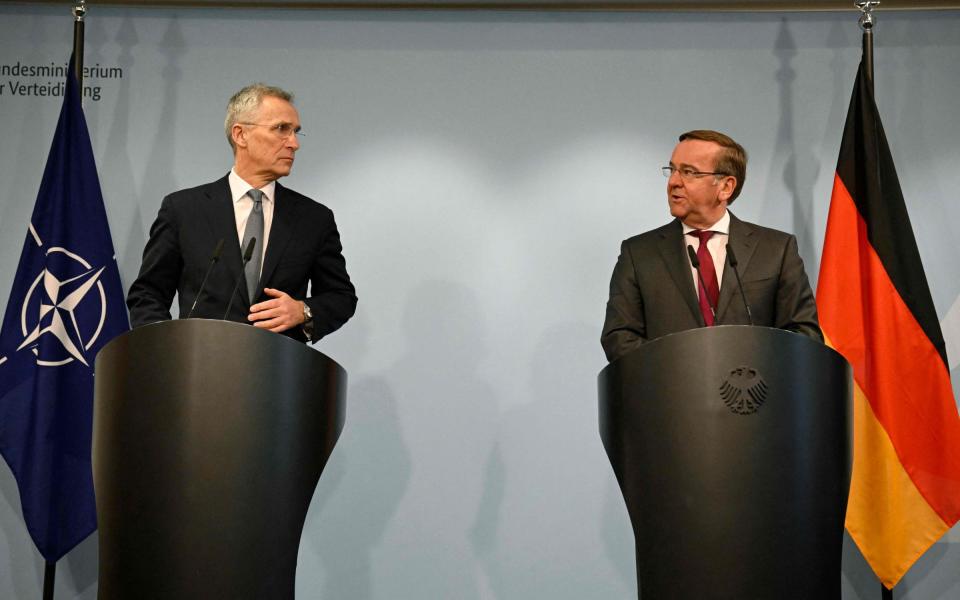Hammer blow for Vladimir Putin as Ukraine to get 200 tanks from West

- Oops!Something went wrong.Please try again later.
The West is poised to send nearly 200 battle tanks to Ukraine in a potential hammer blow that could help Kyiv win its war against Vladimir Putin.
It came after Germany finally succumbed to weeks of international pressure and agreed to donate some of its Leopard 2 tanks.
Berlin also relented on allowing other countries, such as Poland, to re-export German-made Leopard 2s, which could happen within days.
Meanwhile, the United States dropped its opposition to sending M1 Abrams tanks - potentially dozens of them - in a major escalation of its involvement.
The UK has already become the first ally to pledge tanks to Ukraine, having said it would send 14 of its Challenger 2s.
Under international agreements, other countries must be granted permission by Berlin to send their Leopard 2s.
Officials in Kyiv have suggested a dozen nations were willing to donate a total of up to 100 of them, if given permission by the German government.
Germany itself was reportedly preparing to send 14 tanks, with Olaf Scholz, the country’s chancellor, expected to make an announcement as soon as Wednesday.
“Today, the chancellor made a decision that no one took lightly,” said Christian Duerr, parliamentary leader of the co-governing Free Democrats. “The fact that Germany will support Ukraine with the Leopard tank is a strong sign of solidarity.”
US officials suggested their plans were being finalised, with options to send up to 50 Abrams. An announcement is expected later this week.
It brought the total number of tanks Kyiv can expect to have at its disposal to nearly 200, with potential for more.
Meanwhile, Switzerland, which has a long-held tradition of neutrality, appeared to be moving towards allowing other countries to re-export Swiss-made weapons to Ukraine - including Piranha tanks and anti-aircraft guns.
Volodymyr Zelensky, the Ukrainian president, has long pleaded for tanks, which would be key to punching through Russian defences in a Ukrainian counter-offensive to regain its territory.
Andriy Yermak, his chief of staff, said: “This is going to become a real punching fist of democracy against the autocracy from the bog."
Kirill Mikhailov, a Kyiv-based military researcher, told The Telegraph that deliveries of tanks on that scale could "change the course of the war".
He said: “We’ve already passed the end of the beginning. What you need now is to be able to replenish the Ukrainians to the point where the Russians will constantly be on the retreat.”
He said the US would be likely to settle on 50 Abrams, adding: "It is the minimum that makes sense logistically on the battlefield."
Sending less would mean the Abrams’ "usefulness would outweigh their strain on logistics chains".
The developments resolved a period of protracted friction over the issue of sending tanks, which had exposed a diplomatic rift in the Western alliance.
US officials had maintained that Abrams tanks were unsuitable for use in Ukraine because they are difficult to operate and maintain, require extensive training and need frequent refuelling.
They have long believed Germany's Leopard 2s were a better fit, because they have interchangeable parts and are easy to maintain.
However, Mr Scholz had refused to allow their use, saying Berlin would not "go alone".
The White House and Pentagon were caught off guard by the strength of the German reluctance.
No agreement was reached in a meeting of 50 Allied defence ministers at the US air base in Ramstein, Germany, on Friday.
But following intense behind-the-scenes negotiations, including one senior US official reportedly "reading the riot act" to his German counterpart, a transatlantic tank deal appeared to have been struck.

US officials cautioned that there had been no final decision in Washington, but their position was softening and a "significant" number of Abrams could now be sent.
Shortly before the German and US reversals emerged, Chris Coons, a Democrat senator and a close ally of Joe Biden, the US president, told Politico: "If the Germans continue to say we will only send or release Leopards on the condition that Americans send Abrams, we should send Abrams."
It could take months to deliver the 70-ton Abrams tanks and train Ukrainian forces in how to use them.
However, the change in US position appears to have helped to unlock the German resistance.
Mateusz Morawiecki, Poland’s prime minister, called on Berlin "not to procrastinate, not to delay, but just to take brave decisions".
He said Berlin's longstanding purchases of Russian energy meant they had a "special responsibility" in the conflict.
In a further sign of a break in the deadlock, Berlin suggested that nations willing to donate their Leopards could begin training Ukrainian crews.
It came as Jens Stoltenberg, Nato’s secretary-general - who was meeting Boris Pistorius, the German defence minister, for talks in Berlin - said he was "confident" of a tank deal.

The US has already authorised the sending of Bradley Fighting Vehicles and Stryker armoured personnel carriers, which the Pentagon believes are better suited for the challenge in Ukraine.
Dmitry Peskov, the Kremlin spokesman, said the new tank deliveries “would bring nothing good to the future relations”.

